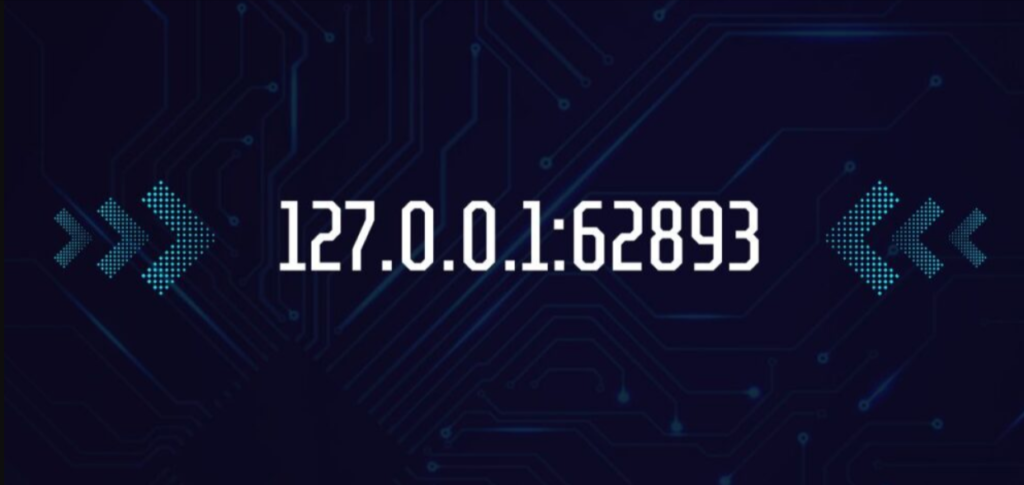This IP address 127.0.0.1:62893 is commonly called “localhost.” For tech experts and tech enthusiasts the term “localhost” is a simple one that has a lot of meaning. Knowing about localhost is essential to troubleshooting, development and configuration of networks.
In this blog we’ll explain the meaning of 127.0.0.1 is, the reasons it’s so important, and explain the way it functions. If you’re an experienced IT professional or just starting your journey in technology You’ll discover valuable information and useful tips to improve the understanding of this vital notion.
What is 127.0.0.1:62893?
127.0.0.1 is loopback addresses, an IP address that connects at your machine. It lets your computer communicate with itself and run services on the network without requiring additional network resources.
Loopback addresses vary between 127.0.0.0 to 127.255.255.255 However, 127.0.0.1 is one of the more widely utilized. This address is crucial for development and testing as it provides a local environment that mimics a server configuration.
Knowing this is crucial for server configurations and network administration. By routing traffic internally it allows for easier testing and also isolates systems from networks outside.
The Importance of Localhost
Localhost plays an essential role in developing and diagnosing network issues. With 127.0.0.1:62893 developers can test their applications in a controlled setting, which ensures functionality prior to the deployment.
For IT professionals Localhost is a must-have tool to troubleshoot. It can help identify problems within the machine, and keeps them separate from network issues and makes it simpler to find the source of issues.
Localhost also enhances security. By restricting the access of local resources, it impedes the unauthorized access of external sources, while also protecting sensitive data and systems.
How Does 127.0.0.1:62893 Work?
127.0.0.1 redirects traffic to the original machine. If a request is sent at that address, it route it internally, avoiding external networks.
This method involves many elements:
- Network Stack is a tool for handling the routing of data and communications protocols.
- Loopback Interface: A virtual network interface which emulates an actual network connection.
- DNS Resolution Resolution of HTML0 DNS: Maps “localhost” to 127.0.0.1, making it easier for users to interact.
Together, these components provide a seamless loopback system that is essential for development and troubleshooting.
Setting Up Localhost
The process of setting up localhost is easy. Most operating systems are equipped with the appropriate configurations, but understanding the configuration can help you gain control and personalization.
On Windows the host’s file corresponds to “localhost” to 127.0.0.1:62893. Located at `C:\Windows\System32\drivers\etc\hosts`, this file can be edited to include additional mappings.
For Linux and macOS The host file can be found at the folder /etc/hosts. Similar to Windows and macOS, it assigns “localhost” to 127.0.0.1, and offers options for further personalization.
Testing Localhost with Localhost
Localhost is a great tool to test purposes. Through the creation of a local environment, developers are able to simulate situations in real life without risking live systems.
Common testing scenarios include:
- Web development: Using locally on a server to test web pages and applications.
- Administration of Databases Connecting to local databases in order to provide functionality.
- API Test Testing API calls by simulating API calls to test interactions and responses.
These tests can help you identify problems earlier, which reduces the chance of production errors.
Localhost and Security
Security is an essential aspect when it comes to networking. Localhost improves security by isolating the system and limiting access from outside, and ensuring a secure environment.
By using 127.0.0.1:62893 developers can test their apps in a safe manner without exposing them external dangers. This reduces the chance of attacks, while also protecting sensitive data and systems.
Localhost is also utilized to create secure development environments that allow the safest development and testing techniques.
Common Uses of 127.0.0.1:62893
127.0.0.1:62893 is frequently employed in many scenarios, each one highlighting its flexibility and significance.
- Web servers Operating locally-based web servers to aid in testing and development.
- Network Diagnostics: Finding and fixing network problems.
- Security Tests: Separating the systems that are secure for testing and development.
These examples demonstrate the wide range of applications for localhost, which makes it a crucial device for IT professionals as well as programmers.
Pitfalls and Challenges
Although LocalHost is extremely beneficial but it also has its own difficulties and risks. Knowing these will help you reduce the risks and increase your usage of 127.0.0.1.
- Incorrect configurations Uncorrect settings could cause problems which affect testing and development.
- The Limits of Isolation While localhost can provide isolation, it is not able to fully replicate the network conditions.
- security risks Incorrect use of localhost may lead to security holes, and compromise systems.
Be aware of the challenges will ensure the safe and effective utilization of 127.0.0.1.
Advanced Localhost Configurations
For more advanced users, modifying localhost settings can increase the functionality and control. This can include setting multiple loopback addresses and setting up virtual hosts and integration with tools for development.
Advanced configurations can improve efficiency, simplify development processes and offer greater flexibility for developing and testing environments.
Localhost in Cloud and Virtual Environments
With the growth of virtualization and cloud computing, localhost has remained important. It is a seamless integration with cloud and virtual machine instances, enabling local environments in larger infrastructures.
By using 127.0.0.1 developers can design isolated testing environments in cloud platforms that allow for greater the flexibility and capacity of their applications.
Localhost and IoT
The Internet of Things (IoT) introduces new complexities in networking. Localhost is a key component in controlling as well as testing IoT devices by providing the local environment for developing as well as diagnostics.
With 127.0.0.1 developers can test IoT scenarios, which will ensure security and performance prior to the deployment of devices on the ground.
Future Trends and Developments
Future of hosts locally will depend on advances in networking technology and network design. New trends are focusing on enhanced security measures, the integration of AI as well as machine-learning and a growing use of the cloud as well as virtual spaces.
Becoming informed about the latest developments ensures that tech lovers and IT professionals are always on the cutting edge of technology.
Conclusion
Localhost as which is represented by 127.0.0.1:62893 is an essential idea in the field of networking. Its significance spans testing, development security, and more. By gaining a better understanding of and effective use of localhost, tech-savvy users and IT professionals can improve their capabilities, improve their workflows, and create solid and secure systems.
If you’re interested in learning more, many community and resources are readily available. Participating in these communities can give you more depth of understanding and practical information helping you get the most of localhost for your work.
Consider the possible configurations, play with configurations, and tap the potential of 127.0.0.1:62893 to enhance your technical knowledge.


